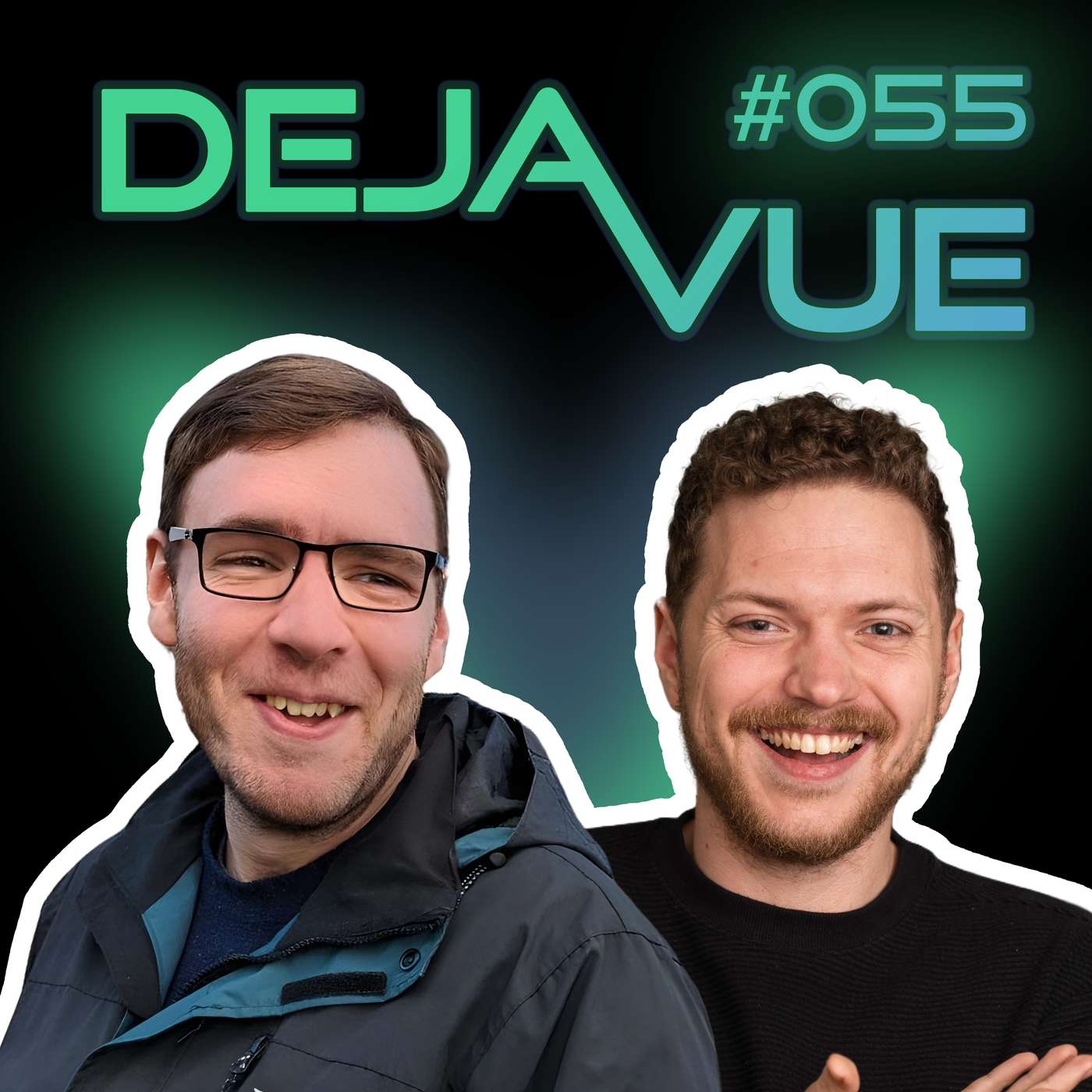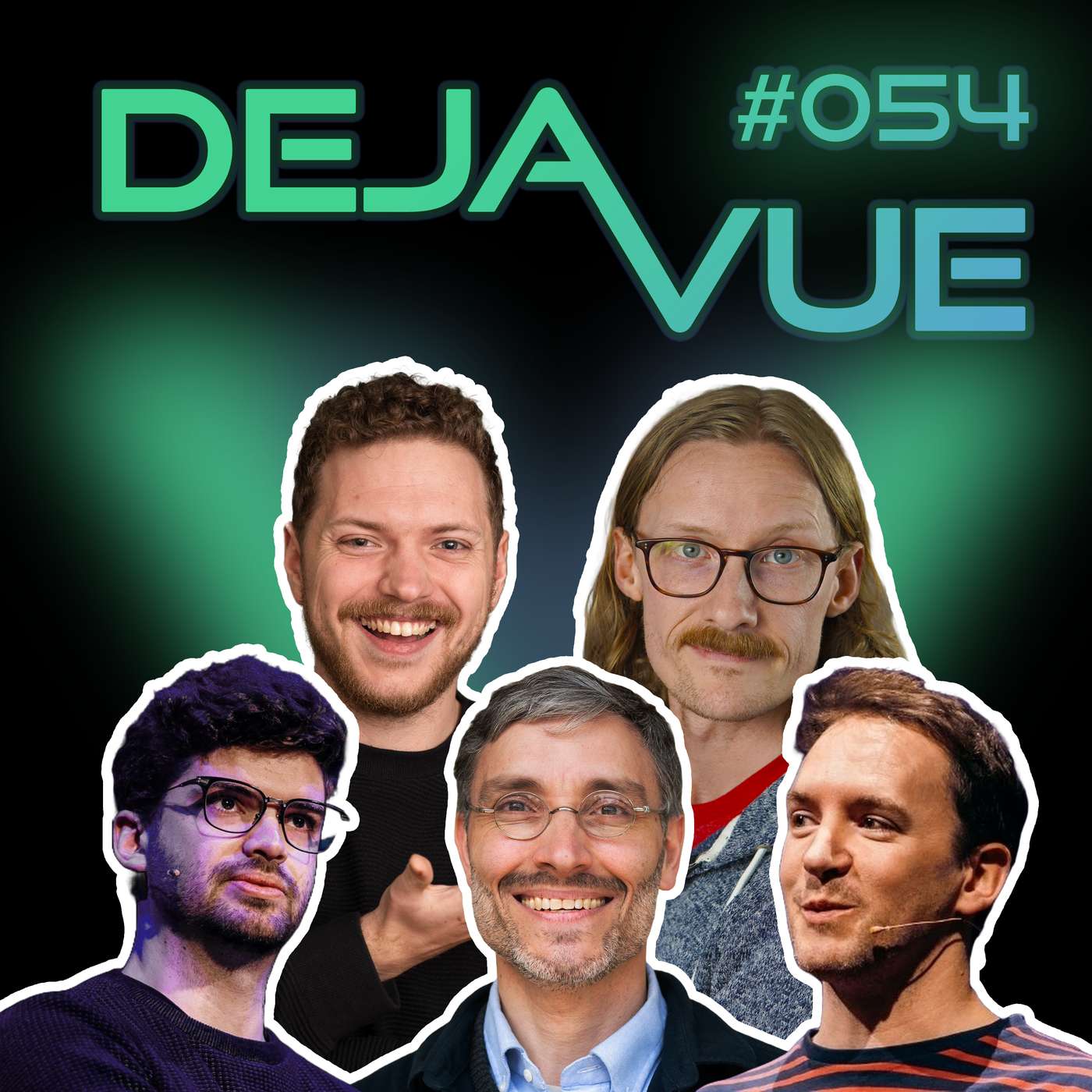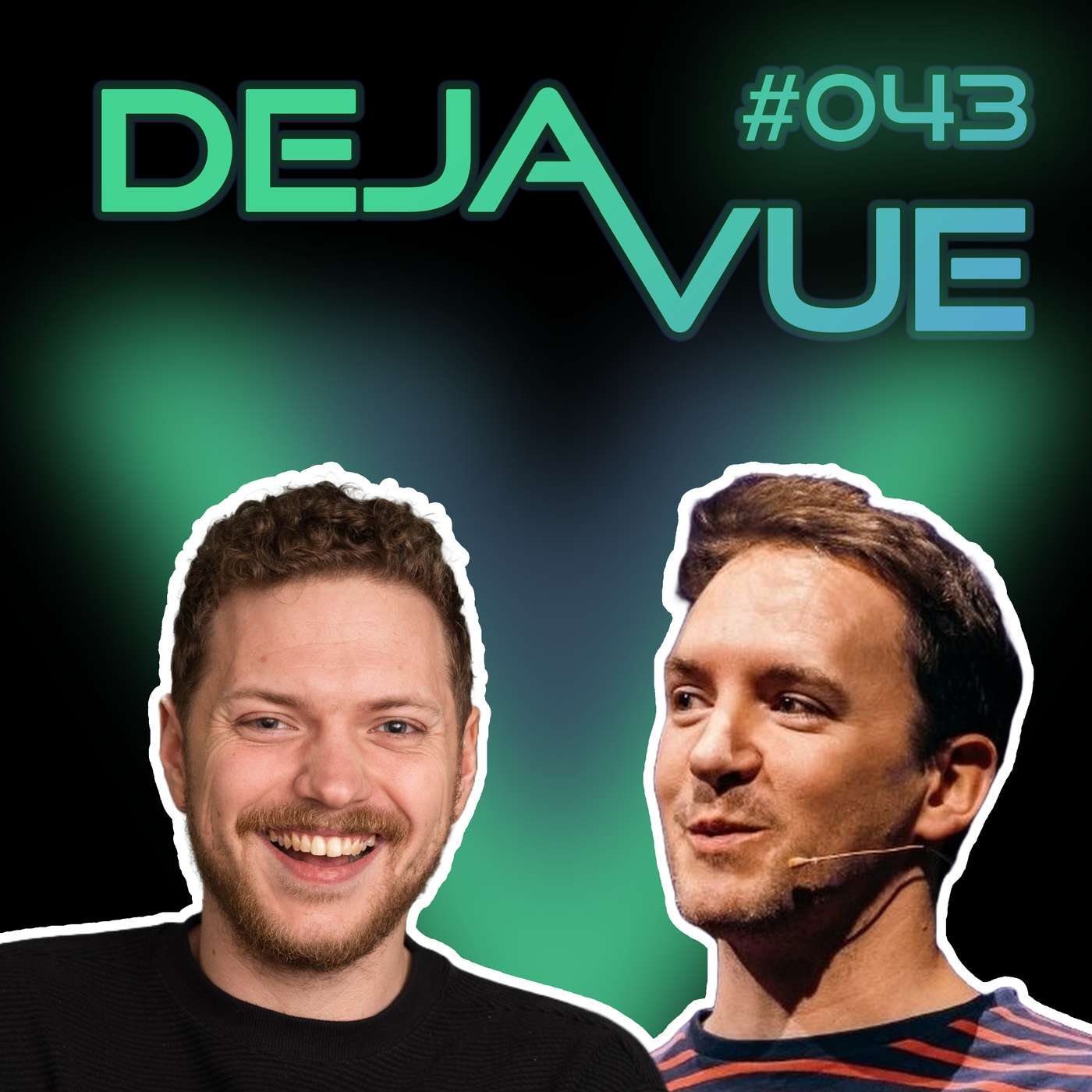Discover DejaVue
DejaVue

DejaVue
Author: Alexander Lichter & Michael Thiessen
Subscribed: 23Played: 901Subscribe
Share
© 2025 Alexander Lichter & Michael Thiessen
Description
Welcome to DejaVue, the Vue podcast you didn't know you needed until now! Join Michael Thiessen and Alexander Lichter on a thrilling journey through the world of Vue and Nuxt.
Get ready for weekly episodes packed with insights, updates, and deep dives into everything Vue-related. From component libraries to best practices, and beyond, they've got you covered.
Get ready for weekly episodes packed with insights, updates, and deep dives into everything Vue-related. From component libraries to best practices, and beyond, they've got you covered.
62 Episodes
Reverse
In this special episode of DejaVue, Alexander and Michael are joined by Daniel Roe and Sébastien Chopin to discuss the recent acquisition of NuxtLabs by Vercel. Questions like "Was Nuxt just sold", "How much influence has Vercel", and "What is Vercel excepting from the deal" are answered.If you wonder what impact the deal has on Nuxt, you as a user and developer, as well as the open-source community, you should tune in! Enjoy the Episode!Our GuestsDaniel RoeBlueskyWebYouTubeTwitchSébastien ChopinNuxtLabsNuxtPersonal WebsiteBlueskyChaptersLinks and ResourcesAnnouncement on NuxtLabs.comSkew Protection Nitro IssueDaniel Roe's Reddit AMAThe Future of Nuxt GitHub DiscussionPooya's Nitro AnnouncementYour HostsAlexander LichterBlueskyYouTubeWebsiteMichael ThiessenTwitterYouTubeWebsite---Links marked with * are affiliate links. We get a small commission when you register for the service through our link. This helps us to keep the podcast running. We only include affiliate links for services mentioned in the episode or that we use ourselves.
👉 Don't forget to join ViteConf on October 9-10 in AmsterdamIn this episode of DejaVue, Michael and Alexander look into the major release of Vite 7, including the move to ESM-only, dropping Node 18 support, and adopting the Baseline browser target.They also discuss the evolving Environment API, upcoming changes in Rolldown-Vite, new Vite dev tools, and more.Enjoy the Episode!Chapters(00:00) - Welcome to DejaVue
(00:48) - Vite 7 without breaking changes
(01:53) - Node Version dropped
(03:13) - ESM-only and Module Formats
(09:04) - What does ECMA and GIF mean?
(10:51) - Browser target to Baseline Wide Available
(14:31) - Environment API
(16:14) - Rolldown-Vite
(17:39) - Cleaning up APIs
(18:11) - Vite Dev Tools
(21:41) - ViteConf
(22:57) - Vite Plugin Vue Beta
(25:04) - Wrapping Up
Links and ResourcesVite Announcement postrequire(esm) in Nodetsdownobuildfdir PRDejaVue #E058 - The History of Nuxt and NuxtLabs (with Sébastien Chopin)DejaVue #E051 - Vite Inside Out (with Matias "Patak" Capeletto)Vite DevTools Preview (screenshot)Vite Plugin Vue 6.0 (not beta anymore)Your HostsAlexander LichterBlueskyYouTubeWebsiteMichael ThiessenTwitterYouTubeWebsite---Links marked with * are affiliate links. We get a small commission when you register for the service through our link. This helps us to keep the podcast running. We only include affiliate links for services mentioned in the episode or that we use ourselves.
Big news in the Nuxt ecosystem. While you out there already know what has been announced - some of us didn't. Luckily, Daniel Roe, Head of the Nuxt team joins this DejaVue episode and discusses the highly anticipated "double trouble": Not one, but two major versions for Nuxt are on the horizon.After over a year of delays, Daniel reveals the strategic decision to release Nuxt 4 in less than a month from now, followed by Nuxt 5 which will include the long-awaited Nitro 3 integration and significant Vite improvements.The episode covers the smooth migration experience early adopters reported already, the philosophy behind careful breaking changes, and how the team plans to maintain a yearly major release cycle moving forward.Enjoy the Episode!Our GuestDaniel RoeBlueskyWebYouTubeTwitchChapters(00:00) - Welcome to DejaVue
(01:19) - The big topic
(02:41) - What are the release plans?
(06:47) - Two major versions soon?
(09:28) - Early adopters of compatibilityVersion 4
(11:56) - Depending on other dependencies and versions bumps
(13:45) - Is bumping the minimum Node version a breaking change?
(16:33) - A Quick Nitro TL;DR
(20:46) - Nitro in other frameworks
(25:20) - Why Nuxt 4 now?
(28:41) - LTS support Plans
(29:53) - Nuxt Bridge
(31:46) - Release Dates and skipping Nuxt 4 altogether
(33:14) - We need Release names!
(35:53) - Release Dates for Nuxt 4 and 5
(40:00) - Wrapping Up
Links and ResourcesRoadmap to v4 blog postDejaVue #E043 - The Year in ReVue (with Daniel Roe)DejaVue #E044 - Our Predictions for Vue and Nuxt in 2025 (with Daniel Roe)DejaVue #E013 - The Road to Nuxt 4 (with Daniel Roe)Daniel's PR migrating ElkNuxt 4 Migration GuideDejaVue #E003 - Nitro: The Next Generation Server ToolkitSrvxMichael's Nuxt Release Date ComicAlex' Nuxt 4/5 videoYour HostsAlexander LichterBlueskyYouTubeWebsiteMichael ThiessenTwitterYouTubeWebsite---Links marked with * are affiliate links. We get a small commission when you register for the service through our link. This helps us to keep the podcast running. We only include affiliate links for services mentioned in the episode or that we use ourselves.
Join Alex and Michael with special guest Sébastien Chopin, creator of Nuxt.js and CEO of NuxtLabs, to learn more about the origins and evolution of the Vue-based meta framework. Sébastien shares valuable lessons from open source, how he came to create Nuxt.js in the first place and which challenges came with it.In the second part of the episode, they cover Sébastien's company NuxtLabs - from its inception over to taking Venture Capital and products, such as NuxtHub or Nuxt UI Pro.Eventually, the NuxtLabs CEO also outlines how they handle sponsorships of maintainers, and what the future holds for Nuxt and NuxtLabs.Enjoy the Episode!Our GuestSébastien ChopinNuxtLabsNuxtPersonal WebsiteBlueskyChapters(00:00) - Welcome to DejaVue
(01:16) - How did you get into programming?
(04:45) - The birth of Nuxt.js
(07:43) - The Elevator Pitch for Nuxt
(10:16) - When not to use Nuxt
(11:20) - Nuxt as Multi Bundler Framework
(12:37) - How does Nuxt scale (in Enterprise)?
(16:04) - Lessons Learned from building Nuxt
(19:47) - How to compare frameworks fairly?
(23:20) - Frameworks converging
(24:22) - Nuxt.js supporting React?
(29:06) - The creation of NuxtLabs
(33:50) - Products of NuxtLabs
(37:11) - Why going all in on Cloudflare for NuxtHub
(41:50) - Vite Environment API
(45:34) - The difference between Nuxt and NuxtLabs
(51:56) - Is Nuxt a VC-backed framework?
(53:51) - Sponsoring Core Maintainers
(56:07) - Freemium in Nuxt
(57:06) - Sneak Peek of the NuxtLabs Roadmap
(59:51) - Where can people find you?
Links and ResourcesNuxtIntro to Nuxt LayersNitroReactivueinclusion-vaporDejaVue #E044 - Our Predictions for Vue and Nuxt in 2025 (with Daniel Roe)VoltaNuxt UI *Nuxt GovernanceNuxt StudioNuxtHubLaravel VaporCloudflareDejaVue #E051 - Vite Inside Out (with Matias "Patak" Capeletto)StrapiYour HostsMichael ThiessenTwitterYouTubeWebsiteAlexander LichterBlueskyYouTubeWebsite---Links marked with * are affiliate links. We get a small commission when you register for the service through our link. This helps us to keep the podcast running. We only include affiliate links for services mentioned in the episode or that we use ourselves.
In this episode of DejaVue, Michael and Alex chat with Matt Perry, the creator of Motion (formerly Framer Motion), about animations in web development.Matt talks about his journey from designing gaming magazines as a kid to becoming a full-time developer, sharing his experiences with ActionScript, jQuery, and how Motion was born. They discuss how simple and powerful Motion's API is, its ability to work with different frameworks, and how it stacks up against other animation libraries like GSAP and AnimeJS.But the episode also covers a lot of open source aspects, such as the challenges of keeping Motion going! Matt explains how Motion+ funds the development of Motion with one-time payments and time-gated (then publicly available) content, to support the project.Enjoy the episode!Our GuestMatt PerryMotionPersonal WebsiteBlueskyTwitterChapters(00:00) - Welcome to DejaVue
(01:20) - How did you get into programming?
(05:18) - Adobe ActionScript
(08:33) - What is Motion (fka. Framer Motion)?
(12:21) - APIs and Limitations
(16:54) - Prerequisites for using Tools
(24:26) - The jQuery of web animations
(26:37) - The birth of Motion
(31:02) - Motion for Vue
(32:40) - Other "Motion for ..." adaptations?
(34:36) - Funding the project - Motion+
(40:00) - One-time Payment and Time-gating
(50:39) - Thoughts on other ways of monetizing Motion
(52:43) - Can AI replace animation libraries?
(57:41) - The difference between Motion and other libraries
(01:01:04) - Closing Thoughts
Links and ResourcesActionScriptECMAScriptPopmotionMotionMotion VueRick (Motion Vue maintainer)FramerDejaVue #054 - Open Source Sustainability (with Daniel Roe, Chad Whitacre & Rijk van Zanten)GSAPAnimeJSYour HostsMichael ThiessenTwitterYouTubeWebsiteAlexander LichterBlueskyYouTubeWebsite---Links marked with * are affiliate links. We get a small commission when you register for the service through our link. This helps us to keep the podcast running. We only include affiliate links for services mentioned in the episode or that we use ourselves.
In this episode of DejaVue, Alex and Michael are joined by Jared Wilcurt, UI architect and open source contributor, to get knee-deep into the world of testing in Vue.js, especially Snapshot Testing.Jared shares his journey from React frustration to Vue enthusiasm, and explains how he identified gaps in Vue's testing ecosystem that led to the creation of his Vue 3 Snapshot Serializer library.No matter if you are a testing novice, wondering why you should bother with tests at all, or an experienced developer looking to improve your snapshot testing workflow, this episode got something for you - from reducing test noise, improving readability, and gaining confidence in your Vue applications and components.Discover how snapshot testing complements traditional assertion-based tests and why it might be the missing piece in your testing strategy.Enjoy the episode!Our GuestThe Jared WilcurtVue 3 Snapshot SerializerWebsiteBlueskyTwitterChapters(00:00) - Welcome to DejaVue
(00:20) - How did you get into Programming?
(05:20) - Learning Vue
(09:46) - Finding gaps in the ecosystem
(12:40) - What is unit testing?
(21:40) - Testing in the frontend
(25:31) - Snapshot Testing
(29:45) - Snapshot Updating Fatigue
(36:09) - Responsibilities & ROI of a Snapshot Test
(42:46) - Using the Snapshot Serializer
(46:40) - Snapshot vs. Visual Regression Testing
(52:57) - A good tip from Daniel Roe
(53:50) - Further Noise Reduction
(01:01:22) - A tighter integration?
(01:05:11) - Wrapping up
Links and ResourcesRiot JSVue Indy MeetupVue DoxenOld Jest Snapshot SerializerVue Test UtilsTesting Library VuePlaywrightVue 3 Snapshot SerializerDejaVue #E043 - The Year in ReVue (with Daniel Roe)Your HostsMichael ThiessenTwitterYouTubeWebsiteAlexander LichterBlueskyYouTubeWebsite---Links marked with * are affiliate links. We get a small commission when you register for the service through our link. This helps us to keep the podcast running. We only include affiliate links for services mentioned in the episode or that we use ourselves.
In this episode of DejaVue, Alex sits down with James Garbutt, open source maintainer and lead of the e18e initiative. James shares his journey from writing web scrapers as a teenager to maintaining critical JavaScript libraries like parse5 or Chokidar and eventually co-creating the ecosystem performance initiative.The conversation is then all around e18e, which aims to improve performance across the JavaScript ecosystem through three pillars:Cleaning up dependency treesSpeeding up popular packagesCreating lighter alternatives to bloated librariesJames explains how the community-driven approach has produced impressive results all across the web development landscape.Learn about real-world examples of performance improvements, including replacement packages like tinyglobby and nano-staged, and discover how to contribute to e18e even if you're new to open source. James shares also insights on balancing between backward compatibility and performance, bundling dependencies, and also shares future plans for e18e in 2025.Enjoy the episode!Our GuestJames "43081j" Garbutte18eWebsiteBlueskyChapters(00:00) - Welcome to DejaVue
(00:34) - Which libraries do you maintain?
(02:10) - How did you get into programming?
(04:57) - What lead you to Vue.js
(06:40) - Not ending up in a framework bubble
(09:41) - Meta frameworks converging
(11:28) - What is e18e?
(15:40) - The purpose of e18e
(18:27) - How to participate?
(20:38) - Are there prerequisites?
(23:59) - Ripple effects from e18e improving the ecosystem
(26:36) - Helping other projects migrate
(30:27) - Considering backwards compatibility
(35:50) - Example for replacement packages
(37:56) - tinyglobby
(40:40) - Edge cases and modular architecture
(43:49) - Performance pattern and anti pattern
(45:32) - Bundling dependencies
(50:48) - What is planned for e18e in 2025?
(56:39) - How do you lead and structure the e18e initiative?
(01:01:42) - Anything else we didn't cover?
(01:02:21) - Wrapping up
Links and ResourcesParse5Doom in TypeScriptFlappy Bird in TSLitElementSpeeding up the ecosystem blog post series by Marvin Hagemeistere18e issue overviewe18e Discordminizlib install size improvementsStorybook dependency tree reductione18e module replacement repositoryAnthony Fu's node_modules inspectorPublint by Bjorn LuUmbrella CLInano-staged (instead of lint-staged)npm-run-all2eslint-import-plugin-x (instead of eslint-plugin-import)tinyglobby (instead of any other glob lib like globby/fast-glob)fdirVite Devtools announcementBundling dependencies (and when not to do it)A lighter Nuxt CLIYour HostsAlexander LichterBlueskyYouTubeWebsite---Links marked with * are affiliate links. We get a small commission when you register for the service through our link. This helps us to keep the podcast running. We only include affiliate links for services mentioned in the episode or that we use ourselves.
Join hosts Michael Thiessen and Alexander Lichter for a special episode of DejaVue - a fascinating panel discussion on open source sustainability with three open source enthusiasts: Daniel Roe (Nuxt Team Lead),Chad Whitacre (Head of Open Source at Sentry), and Rijk van Zanten (CTO and co-founder of Directus).The panelists dive deep into what sustainability truly means in open source and get deep into the weeds of different licensing models, debating whether open source functions as a gift economy, and discuss the challenges of project governance.The panel also discusses important questions about leadership structures in open source projects, the role of companies in funding development, and practical ways everyone can contribute to making the ecosystem more sustainable - whether financially or through other meaningful contributions.Enjoy the episode!Our GuestsDaniel Roe - Nuxt Team Lead BlueskyWeb Chad Whitacre - Head of Open Source at Sentry BlueskyTwitterWebRijk van Zanten - CTO and co-founder of Directus BlueskyTwitterWebChapters(00:00) - Welcome to DejaVue
(04:06) - What is Open Source Sustainability
(12:51) - Open Source as a gift economy
(19:20) - The Projects and their Licenses
(29:50) - Sentry is not Open Source
(34:53) - Open Source Definition and OSI
(37:09) - Why people adopt open source software?
(39:44) - Open Source Governance
(47:50) - Stewarding an open source team
(52:22) - Open Source Leadership
(55:40) - What can YOU do to help open source?
Links and ResourcesMastering Nuxt*xkcd on standardsJacob Kaplan-Moss: Paying Maintainers is GoodSentryDirectusNuxtBSLFair Source MITAGPLOSIBDFLNuxt GovernanceOpen Source Steward in the CRADaniel Roe: Contributing to NuxtOpen Source PledgeYour HostsAlexander LichterBlueskyYouTubeWebsiteMichael ThiessenTwitterYouTubeWebsite---Links marked with * are affiliate links. We get a small commission when you register for the service through our link. This helps us to keep the podcast running. We only include affiliate links for services mentioned in the episode or that we use ourselves.
Nuxt 3.16 dropped and it's packed with goodies! In this episode, Alex and Michael break down all the cool stuff in this release that'll make your Nuxt development smoother.They dive into the new command to initialize a Nuxt application, the performance-game-changing lazy hydration support that'll boost your app's performance, and named layer aliases (that you've been waiting for). Plus, huge performance improvements, better error messages with Nitro 2.11 and debugging improvements that'll save you hours of head-scratching.But wait, there's more! The duo also geeks out over Nuxt UI v3, which (surprise!) now works with plain Vue.js too - not just Nuxt. Learn how it leverages Tailwind v4, introduces a sweet CSS variables-based design system, and builds on Reka UI primitives for better accessibility. And somehow, a discount code for Nuxt UI Pro* *cough DEJAVUE cough* gets snuck in there too!Enjoy the episode!Chapters(00:00) - Intro
(00:54) - Nuxt 3.16 Feature Overview
(01:27) - A new way to initialize Nuxt projects
(07:06) - Lazy Hydration in Nuxt
(16:05) - Named Layer Aliases
(17:45) - Lines of Code vs. Complexity
(20:16) - What a new Nitro minor brings to the table
(21:33) - Fine-grained debugging options
(23:25) - Nuxt Devtools v2
(25:47) - Faster module resolution (and faster boot up time)
(27:39) - Using OXC to speed up component parsing
(28:58) - Benchmark performance improvements
(31:43) - Nuxt UI v3
(40:58) - Sneak peek at next weeks episode 👀
(41:17) - Suggest a new slogan!
Links and ResourcesMastering Nuxt is out now!*Nuxt UI* Get 20% OFF Nuxt UI PRO* with discount code DEJAVUENuxt 3.16 blog postVue implementing Lazy HydrationNuxt Lazy Hydration PRLazy Hydration in-depthMore about Nuxt LayersRevamping data fetching in Nuxt PRNitro 2.11YouchHarlan's PR to speed up module resolutionOXC PRRolldown-viteCodSpeedTailwind VariantsYour HostsAlexander LichterBlueskyYouTubeWebsiteMichael ThiessenTwitterYouTubeWebsite---Links marked with * are affiliate links. We get a small commission when you register for the service through our link. This helps us to keep the podcast running. We only include affiliate links for services mentioned in the episode or that we use ourselves.
In episode 52 of DejaVue (yes, it is a whole year), Dennis Adriaansen joins Michael and Alex to discuss data visualization in Vue.js. Dennis shares insights about building chart components, his experience with different charting libraries, and introduces his own Vue charting library. They explore topics like chart customization, performance considerations, and integrating charts into dashboards.The conversation also gets into broader topics such as open source sustainability, UI libraries, and backend integrations with Nuxt.Enjoy the episode!Our GuestDennis AdriaansenVue Chart LibraryXBSkyChapters(00:00) - Welcome to DejaVue
(00:33) - A year of DejaVue
(01:20) - Another announcement from Michael
(02:52) - How did you get into programming?
(07:07) - Would people choose Vue more if it was more popular?
(11:37) - Podcasts and Hot Takes
(19:03) - Why charts?
(21:05) - How do you get started with building chart components?
(23:39) - What was your use case for charts?
(25:16) - What does Unovis provide?
(29:31) - Why not other Chart Libraries?
(34:34) - Performance of Charts
(38:48) - A tiny Vapor update
(40:40) - Which Charts does your library support?
(44:10) - When do you do Open Source?
(45:05) - Open Source Funding & Contributions
(49:47) - What makes a good Dashboard?
(52:03) - Which backend do you use with Nuxt?
(58:41) - Do you have a preferred UI library?
(01:01:43) - Where can people find you?
Links and ResourcesDejaVue #051 - Vite Inside Out (with Matias "Patak" Capeletto)Mastering Nuxt*DejaVue #E049 - The Fusion of Laravel and Vue (with Aaron Francis)DejaVue #E041 - The Quadruple Migration (with Rijk van Zanten)D3.jsTremor Labschart.jsUnovisDennis' Nuxt error dashboardVapor PlaygroundReading Vue VaporVue Chrts (Dennis' Lib)Open Source PledgeBBF PatternzodvalibotStandard SchemaNuxt UI*Inspira UIReka UIYour HostsAlexander LichterBlueskyYouTubeWebsiteMichael ThiessenTwitterYouTubeWebsite---Links marked with * are affiliate links. We get a small commission when you register for the service through our link. This helps us to keep the podcast running. We only include affiliate links for services mentioned in the episode or that we use ourselves.
Vite is amazing, I think we can all agree on that statement. But what is Vite actually!? Why is it so great, faster than webpack and the "de-facto standard of the web" already?Alex is joined by Vite Core Team member Matias Capeletto, better known as Patak, to talk about all these questions.Learn about the future of Vite, how it uses two bundlers under the hood and why almost every framework adopted it. Enjoy the episode!Enjoy the episode!Our GuestMatias "Patak" CapelettoViteWebsiteBlueskyChapters(00:00) - Chapter 1
(00:00) - Welcome to DejaVue
(52:00) - How did you get into programming?
(05:19) - Working on Open Source Full Time
(08:16) - What is Vite?
(18:48) - Why is Vite so fast?
(22:19) - Rollup and ESBuild?
(26:22) - VoidZero and Rolldown
(34:08) - The Scope of Vite
(36:27) - Vite Environment API
(45:49) - Converging Frameworks
(50:51) - Funding in Open Source
(01:04:24) - React as "the last framework"?
(01:10:18) - CRA Deprecation
(01:24:41) - Where can people follow you?
(01:26:09) - Last Words
Links and ResourcesRolldownSnowpackrolldown/vitevinxiunpluginvite nodeMiniflareAll About VoidZeroDejaVue #044 - Our Predictions for Vue and Nuxt in 2025 (with Daniel Roe)Sunsetting Create React AppCRA PRcreate-tsrouter-appYour HostsAlexander LichterBlueskyYouTubeWebsite---Links marked with * are affiliate links. We get a small commission when you register for the service through our link. This helps us to keep the podcast running. We only include affiliate links for services mentioned in the episode or that we use ourselves.
For episode number 50 (not 51 Alex!), Angular GDE and JetBrains DevRel Jan-Niklas Wortmann joins the show. Together with Michael and Alex they dive into Jan-Niklas' angle of being a DevRel, how framework communities are different and why people should give WebStorm a try. Beyond that, Volar and LSPs are also covered, as well as some new announcements!Enjoy the episodeOur Guest Jan-Niklas WortmannWebsiteWeekly Devs BrewBlueskyChapters(00:00) - Welcome to DejaVue
(01:19) - Guest Intro
(03:49) - Difference of Framework communities
(08:56) - The Ups and Downs of DevRel
(19:52) - Advice for people doing DevRel
(25:05) - What is JetBrains?
(27:46) - Reluctance to change Tools
(31:01) - Why one should check out WebStorm
(42:21) - TypeScript and AI in the IDE
(48:06) - A web-dev newsletter for your coffee break
(49:56) - Where can people follow you?
Links and ResourcesKCDCDejaVue #E033 - Vue or React (with CJ Reynolds)Nuxt Project Template in WebStormDejaVue #E049 - The Fusion of Laravel and Vue (with Aaron Francis)DejaVue #E007 - From Code to DevRel and Leadership (with Marc Backes)Try the new WebStorm TS Engine nowJetBrains JunieThe Weekly Devs BrewYour HostsAlexander LichterBlueskyYouTubeWebsiteMichael ThiessenTwitterYouTubeWebsite---Links marked with * are affiliate links. We get a small commission when you register for the service through our link. This helps us to keep the podcast running. We only include affiliate links for services mentioned in the episode or that we use ourselves.
In this episode, Michael and Alex are joined by Aaron Francis, software developer, content creator, and co-founder of Try Hard Studios. Besides covering Aaron's journey into programming, they dive into Fusion, a new library that Aaron has been working on which will fuse your Laravel backend together with your Vue frontend, allowing you to write PHP and Vue in the same file. The three developers dive deep into the technical details of Fusion, how it works under the hood, and also how the community reactions have been so far.Enjoy the episode!Our GuestAaron FrancisFusionTryHard StudiosBlueskyTwitterChaptersLinks and ResourcesLaravelTryHard StudiosFusionFusion Intro VideoAaron's Laracon EU 2025 TalkDejaVue #E029 - Inertia.js (with Joe Tannenbaum)VolarFusion Reddit PostNuxt Server BlocksDejaVue #E020 - Documentation and Migration: From Vue 2 to Vue 3 (with Natalia Tepluhina)DejaVue #E016 - The Future of Vue.js (with Evan You)Aaron's Year in Review postYour HostsAlexander LichterBlueskyYouTubeWebsiteMichael ThiessenTwitterYouTubeWebsite---Links marked with * are affiliate links. We get a small commission when you register for the service through our link. This helps us to keep the podcast running. We only include affiliate links for services mentioned in the episode or that we use ourselves.
AI is a hot topic in the tech industry, but how does it intersect with Vue.js?In this special episode, Michael and Alex host a panel at Vue.js Nation 2025 and are joined by two amazing guests:Patrick van Everdingen, AI Solutions EngineerDaniel Kelly, Lead Instructor at Vue SchoolThe four developers discuss how AI and Vue can work together. Will we all lose our jobs to AI? How does AI might influence the job market and which tips for Vue.js developers are the most important to know regarding using AI in their projects and workflows? You'll get answers to all these questions, and more in this episode.Thanks againEnjoy the Episode!Our PanelistsPatrick van EverdingenCareerDeck AITwitterDaniel KellyVueSchoolBlueskyTwitterChapters(00:00) - Welcome to DejaVue
(01:08) - Guest Introduction
(02:29) - Will we all lose our jobs to AI?
(09:24) - How have you integrated AI into your daily workflow?
(14:31) - What is your best tip/advice for using AI with Vue.js?
(18:03) - Does the role of documentation diminish with AI?
(26:21) - How do framework and library authors need to adapt to AI?
(31:05) - Where does environmental responsibility intersect with AI?
(38:06) - LLMs and Privacy
(43:10) - How will AI influence the job market?
(45:36) - Where can people find you?
Links and ResourcesDejaVue #E016 - The Future of Vue.js (with Evan You)DejaVue #E044 - Our Predictions for Vue and Nuxt in 2025 (with Daniel Roe)DejaVue #E033 - Vue or React (with CJ Reynolds)DejaVue #E023 - TypeScript and Content Creation (with Matt Pocock)DejaVue #E005 - From Side Hustle to Server Side Events (with Patrick van Everdingen)Vue.js Nation 2025: Daniel Kelly - Vue-doo Magic: AI Development TricksCursor (AI Editor)How Michael uses AI to quickly learn new librariesAnthropic suggesting to use XML tags for structuring promptsWebLLMDejaVue #E045 - Formkit and Hot Takes (with Justin Schroeder)Sign up for Frontend Nation 2025All talks from Vue.js Nation 2025Your HostsAlexander LichterTwitterYouTubeWebsiteMichael ThiessenTwitterYouTubeWebsite---Links marked with * are affiliate links. We get a small commission when you register for the service through our link. This helps us to keep the podcast running. We only include affiliate links for services mentioned in the episode or that we use ourselves.
If you've listened to the last episode, you know what is coming next! It is time to get take a Vue at the other host of this podcast. Michael is asking Alex all around his past - from how we got into programming and web development, if university was worth it and how he got into the Nuxt Core Team.Also don't miss out how Minecraft is part of the history, what non-tech job Alex would do if programming wouldn't be in the cards, and why is GitHub account is over 14 years old.Enjoy the episode!Chapters(00:00) - Welcome to DejaVue
(02:27) - What are you doing for work?
(06:09) - What patterns and bad/best practices have you noticed?
(11:18) - How is it being on the Nuxt team?
(14:05) - Joining the Nuxt team
(17:28) - How did you get into programming?
(25:03) - From Gaming to Modding and Programming
(30:02) - Getting into Web Development
(31:11) - Founding a company
(40:34) - Which courses from university stood out?
(53:49) - What happened between uni and now?
(01:00:12) - When did you start doing YouTube and why?
(01:06:25) - Quickfire
(01:06:38) - Why did you move to Amsterdam?
(01:07:32) - Do you still Minecraft or other games?
(01:08:47) - What topic you could give an impromptu talk on?
(01:10:49) - Wrapping up
Links and ResourcesJoin Vue.js Amsterdam 2025 - Get 10% OFF with the code "DEJAVUE"DejaVue #E046 - A Vue at Michael ThiessenDejaVue #E045 - Formkit and Hot Takes (with Justin Schroeder)DejaVue #E044 - Our Predictions for Vue and Nuxt in 2025 (with Daniel Roe)How to use the repository pattern in NuxtAlex' first Minecraft pluginAlex' Old Bukkit accountAlex' First Issue (actually his 2nd but who counts these!)SmartGain websiteBuilding an Association Manager PlaylistPaladinsCounter side project showcaseMastering Nuxt*Your HostsAlexander LichterBlueskyYouTubeWebsiteMichael ThiessenTwitterYouTubeWebsite---Links marked with * are affiliate links. We get a small commission when you register for the service through our link. This helps us to keep the podcast running. We only include affiliate links for services mentioned in the episode or that we use ourselves.
The guest of this episode is one you've heard on here quite often - but do you also know him well? Together, we take a look (or Vue 👀) at Michael Thiessen, co-host of this podcast.Learn how his average day looks like, how he became a full-time content creator and find out what he did before getting into Web Development, plus insights on how he created his first course and dealt with impostor syndrome.Enjoy the episode!Chapters(00:00) - Welcome to DejaVue
(00:39) - Concept of this episode
(02:00) - What are you doing for a living?
(02:51) - Why did you start writing content about Vue.js?
(04:57) - From a blank page to a blog post
(07:36) - How Michael became a full-time educator
(12:37) - What was the fist course you created and why that one?
(15:45) - Give Feedback!
(19:54) - The key part of creating content
(22:32) - How many hours do you work?
(27:01) - What does an average day look like?
(30:24) - The point to switch to being an full-time educator
(35:10) - How did you get into programming?
(40:17) - Computer Science vs Software Engineering in university
(43:31) - Other learnings from university
(46:43) - How did you find a job after university?
(48:19) - Why Web Development?
(49:46) - From React to Vue
(51:20) - How did you start with public speaking?
(52:30) - Quickfire Questions
(52:38) - If not a developer, what would you be?
(53:02) - Your favorite non-tech hobby?
(53:43) - If you could choose any dev, who would you want to collaborate with and on what?
(54:49) - Where can people follow you?
(55:45) - Wrapping Up
Links and ResourcesVueConf TorontoMichael's previous bandEDM music Michael produced a long time agoQuick Sort DanceLispPrologUnsightMastering Nuxt*Your HostsAlexander LichterBlueskyYouTubeWebsiteMichael ThiessenTwitterYouTubeWebsite---Links marked with * are affiliate links. We get a small commission when you register for the service through our link. This helps us to keep the podcast running. We only include affiliate links for services mentioned in the episode or that we use ourselves.
Together with the FormKit author Justin Schroeder, Michael and Alex discuss the challenges of building forms on the internet.While it seems like a simple task, forms can be complex and pretty time-consuming. Especially when it is more than a Newsletter or Contact Form.Justin shares his experience building FormKit (multiple times), a form library for Vue.js, and how it can help developers build forms faster and more efficiently. From Accessibility to actually covering edge cases such as form hydration and repopulation!Of course, we couldn't let Justin go without talking about some of his hot takes from Vue in 2024, over to Vapor Mode, and Tailwind.Enjoy the episode!Our GuestJustin SchroederBlueskyWebFormKitChapters(00:00) - Welcome to DejaVue
(00:23) - Guest Introduction
(01:15) - How did you get started in programming and Vue.js?
(06:02) - Frameworks as resource for learning patterns
(11:21) - The biggest reason to change a framework
(14:12) - Which framework would you choose for a new project?
(16:26) - SolidStart as a fresh start for a framework?
(17:56) - Adapting and managing expectations as a maintainer
(23:14) - Why Forms are hard and how does FormKit came up?
(32:26) - Accessibility for complex forms and components
(44:37) - How does FormKit sustain itself?
(49:13) - Physical to digital Forms with AI
(53:21) - Do you have to utilize AI as a Developer?
(01:03:42) - Justin's Hot Takes 🌶
(01:04:21) - Vue in 2024
(01:06:22) - Vapor Mode
(01:12:34) - Tailwind and headless components
(01:24:42) - Wrapping up
Links and ResourcesFormKitDejaVue #E039 - Migrating a SaaS from Nuxt 2 to Nuxt 3 (with Sumit Kumar)WCAG 2.0KickStart*Inspira UIMotion-VueFramer Motion for VueAddy Osmani - The 70% problem: Hard truths about AI-assisted codingVue SSR BenchmarkYour HostsAlexander LichterBlueskyYouTubeWebsiteMichael ThiessenTwitterYouTubeWebsite---Links marked with * are affiliate links. We get a small commission when you register for the service through our link. This helps us to keep the podcast running. We only include affiliate links for services mentioned in the episode or that we use ourselves.
After our recap episode on 2024, it is time to look into 2025 - and share our predictions and even some rather spicy hot takes what developers can expect in 2025. Of course, Michael and Alex once again have the Nuxt team Lead Daniel Roe on the show to get some insights on his takes as well! Find out more about their thoughts on Vue Vapor, Nuxt 4, Conferences, Alien Signals, Vue 4, Nitro and many more topics that will be (most likely) relevant in this year.While the focus is mainly Vue and Nuxt, topics around general Web Development are covered too - from AI to Open Source and the job market in 2025.Enjoy the Episode!Our GuestDaniel RoeBlueskyWebYouTubeTwitchChapters(00:00) - Welcome to DejaVue
(01:21) - Daniel's Injuries and Accessibility
(03:13) - Fake teeth and other foolery
(04:10) - Biomodding your teeth
(06:25) - Is 2025 the year of Nuxt 4?
(11:49) - React Metaframeworks and the year of Nitro?
(17:28) - Course Announcements
(21:41) - No more Vinxi in 2025?
(26:03) - A prediction from the future
(31:14) - Will 2025 shift Open Source Sustainability...
(32:08) - ...driven by the WordPress incident?
(36:37) - Why hasn't there been a WordPress fork?
(39:10) - More amazing Conferences coming in 2025?
(42:55) - Vue Vapor in 2025
(47:56) - The Year of AI Agents?
(53:10) - Alien Signals Adoption in the JS World
(54:14) - Vue 4 coming in 2025?
(55:17) - A Unified JavaScript Toolchain in 2025?
(56:12) - The Developer Job Market in 2025
(01:00:21) - What are you predictions for 2025?
(01:00:56) - Daniel's info and Alex' last prediction
Links and ResourcesAccessibility ChartState of JS SurveyAlex' Video on State Of JS through the Vue lenseDaniel's upcoming React to Nuxt courseMastering Nuxt (3 at the time of recording)*Alex' upcoming Nitro CourseBadass Courses' Course Builder RepoVinxiNikhil's tweetNIH tendencyXKCD standardsthanks.devOpen Source PledgeMadVuePragVueKazupon's Tweet on Vapor with other FrameworksMeta on Large Concept ModelsYour HostsAlexander LichterBlueskyYouTubeWebsiteMichael ThiessenTwitterYouTubeWebsite---Links marked with * are affiliate links. We get a small commission when you register for the service through our link. This helps us to keep the podcast running. We only include affiliate links for services mentioned in the episode or that we use ourselves.
Of course, we can't fully start into 2025 with a little ReVue of the past year. And to make sure to catch all the highlights, Alex is joined by Daniel Roe, full-time open source developer and lead of the Nuxt team to go through some notable events of 2024 in the Vue and Nuxt ecosystem.In addition to the shining moments of 2024, don't miss out a deep dive into web fonts, learn why Nuxt 4 isn't out yet if you didn't know already and maybe even get a slight glimpse into 2025 and Nuxt 5.Enjoy the Episode!Our GuestDaniel RoeBlueskyWebYouTubeTwitchChapters(00:00) - The Year in ReVue
(01:08) - Daniel's favorite release in 2024
(02:20) - How did Nuxt Fonts evolve in the past year?
(03:58) - Benefits of Nuxt Fonts
(05:38) - Possible Future Improvements of Nuxt Fonts
(07:45) - What devs do wrong with fonts
(09:29) - The one CI tip saving you troubles
(11:01) - Vue 2 going EOL
(13:20) - Vue's development progress in 2024
(14:31) - Alien Signals
(17:24) - Tooling in Vue
(19:20) - Triaging the ecosystem
(23:53) - Our favorite Nuxt.js improvements
(30:25) - Nuxt 4
(37:14) - Nuxt 2 going EOL and Nuxt Bridge
(41:51) - Incremental improvements in the Vue Ecosystem
(45:24) - The Open Source Pledge
(47:45) - VoidZero
(49:30) - Our Favorite Vue.js Features in 2024
(52:19) - Quickfire
(54:22) - Honorable Mentions
(54:47) - Your feeling about the Vue and Nuxt ecosystem in 2024
(55:51) - Wrapping Up
Links and ResourcesJoin Vue.js Amsterdam 2025* and get 10% off with code DEJAVUENuxt FontsDaniel's Talk at Vue Amsterdam 2024FontainePostCSS Font MagicianAlien SignalsTC39 Polyfill Alien Signals PRVolarVue TSC as part of the language toolssharedPrerenderData VideoUpgrade to Nuxt 4 via compatibilityVersion alreadyNitroSSR Logs in the BrowserNuxt 3.15.2Nuxt BridgeVue MacrosViteElkStackBlitzxkcd 2347: DependencyuseId(Lazy) HydrationdefineModelHydration message improvements on Vue 3.4Reactive props destructurev-bind shorthandNuxt OG ImageUnoCSSVue is the fastest SSR FrameworkInspira UI ComponentsYour HostAlexander LichterBlueSkyYouTubeWebsite---Links marked with * are affiliate links. We get a small commission when you register for the service through our link. This helps us to keep the podcast running. We only include affiliate links for services mentioned in the episode or that we use ourselves.
In this episode, Michael talks with Adam Jahr, Founder of Vue Mastery, all about creating technical content - and how this is relevant for you as a developer.Tune in and figure out how Adam founded Vue Mastery, what his biggest learnings from his Coding Bootcamp times were and learn key tips that can set your content apart from others!And as a bonus - learn what creating content, regardless the format, has to do with Harry Potter or Lord of the Rings.Ready? Then wait no furtherEnjoy the Episode!Our GuestAdam JahrVue MasteryAdam on XVueMastery on YouTubeChapters(00:00) - Welcome to DejaVue
(01:03) - Why creating technical content is key
(02:16) - What is Vue Mastery?
(05:52) - Biggest learnings from Coding Bootcamp times
(09:46) - Getting in touch early with the Vue community
(15:03) - Splitting time between marketing and creating content
(18:40) - Importance of different Creators and learning Formats
(20:07) - How to reach and teach developers
(31:41) - The same framework applied to sales
(33:19) - Applying it to your own stuff
(34:44) - A glimpse down the rabbit hole
(39:22) - Creating an open loop
(43:32) - Music Production and Sourdough
(47:47) - Show them the "Why"
(52:45) - Isolating focus
(58:26) - Magic Move and Animations
(01:03:18) - Where can we follow you Adam?
(01:04:19) - Wrapping up
Links and ResourcesJoin Vue.js Amsterdam 2025* and get 10% off with code DEJAVUEHero's JourneyVue MasteryMichael's Composable Design Course (out now!)DejaVue Episode #020 - Documentation and Migration: From Vue 2 to Vue 3 (with Natalia Tepluhina)Your HostMichael ThiessenTwitterYouTubeWebsite---Links marked with * are affiliate links. We get a small commission when you register for the service through our link. This helps us to keep the podcast running. We only include affiliate links for services mentioned in the episode or that we use ourselves.
























